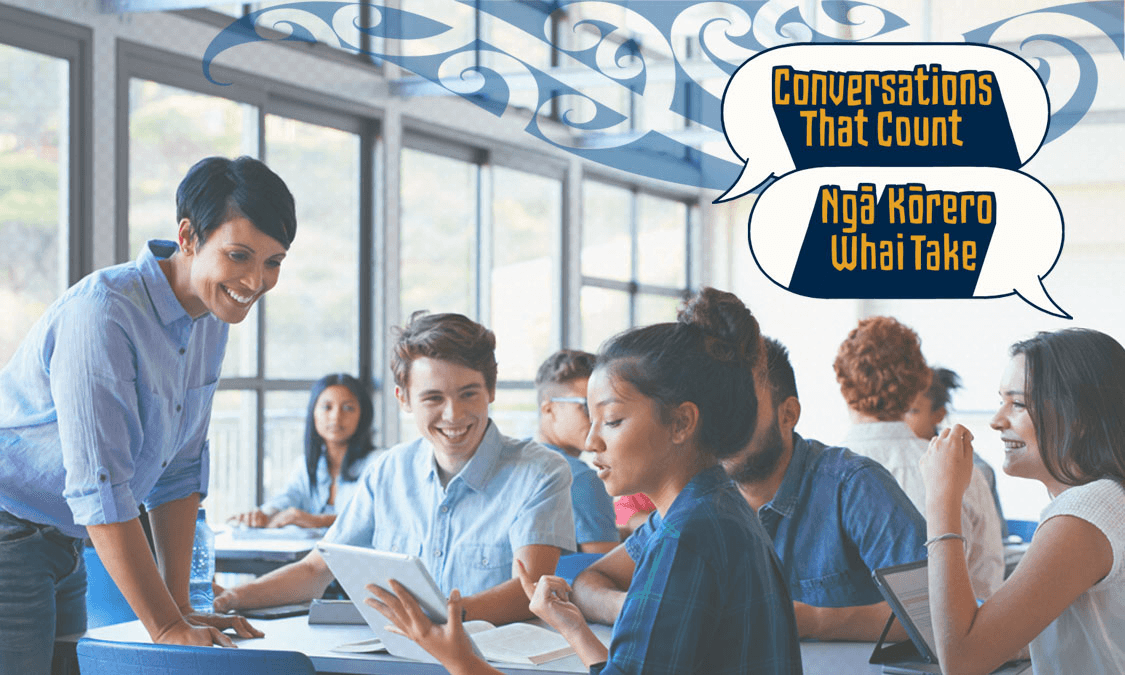The first episode of our new podcast series tackles equality and equity and the role of our education system as a solution. Subscribe now to Conversations that Count – Ngā Kōrero Whai Take, for essential insight into the future of Aotearoa.
The idea that all New Zealanders should have access to equal opportunities is one that rarely meets with opposition. But if inequality is baked into a society, how can we redress the issues underpinning that? Dispensing assistance according to who needs it most might be unequal by definition, but in a world where we don’t all use the same starting blocks, is that the kind of approach needed to ensure fair outcomes?
That problem – of equity v equality – is exactly what the first episode of Conversations that Count – Ngā Kōrero Whai Take, our new podcast produced in partnership with Massey University, seeks to unravel. Broadcaster, author and Massey University lecturer Stacey Morrison hosts the kōrero, joined by Massey University Professor in Innovation and Economics Christoph Schumacher and The Spinoff’s Justin Latif, a former communications director for the Child Poverty Action Group and current chair of the board of a South Auckland primary school.
When asked by Morrison whether New Zealand could reasonably claim to be an equal society, the two are unequivocal.
“I think our stats are fairly clear that large sections of our society are starting on the back foot.” says Latif, “Their children are more likely to grow up in unhealthy homes, their communities are more likely to be policed heavily, and their schools are less likely to be of a high standard.”
According to the Massey University Shared Prosperity index, a wide-ranging longitudinal study assessing the country’s equality of opportunity in a range of areas, New Zealand has seen a significant decline in equality since the 1980s. Professor Schumacher, director of Massey’s Knowledge Exchange Hub and one of the architects of Shared Prosperity, points to the ‘Rogernomics’ market reforms of that decade as one key catalyst for this decline. While he notes that we’ve managed to stall that downward trajectory over the last 10 years, he also points out that we’re still a long way away from true equality.
“To put [our inequality] into context, currently we believe that the top 10% of New Zealanders own about 65% of the total wealth in this country.”
One of the key measures used by Shared Prosperity to map New Zealand’s overall equality is accessibility of education, and quantifying such access can give researchers “a measurable reflection of the distribution of opportunities for individuals.” The study highlights the ability of education to drive substantial change in all areas, stating that “availability of education is an important method of removing barriers to equitable outcomes of other kinds, by generating future prospects that are not tethered to an individual’s initial or current situation.”
For Schumacher however, ensuring equal academic opportunities requires more than simply regulating for equal access.
“Somebody who grows up with both parents having gone to university will end up with a good degree, and we know that’s correlated to a good-income job, which will open doors for you,” he says.
The result is an unequal social structure, where those with a family history of higher education are better equipped to follow that path than those without. And while studies like the Legatum Prosperity Index tell us that education is more accessible here than in many other countries, he points out that access to those opportunities still varies significantly based on circumstance.
“Telling someone they have the opportunity to attend [higher education] – if that infrastructure isn’t there – doesn’t make any difference.”
The potential solutions the panel explores are numerous and wide-ranging – everything from direct government interventions and cooperative efforts by public entities to shifts in the way that we design and implement curricula. One unique opportunity for New Zealand is the value in looking to kaupapa Māori to lead our approach, says Latif.
“A friend of mine who grew up in Ihumātao was telling me about how she grew up sitting at her grandparents’ feet in marae meetings. And she really got a sense of who she was – her culture, her language – but also about the expectations of duty, of responsibility to make the world a better place. And it really struck me that she’s gone on to become a successful journalist and business owner, and many of her cousins are [successful] as well, and they’ve done that based on a really strong anchor that their marae provided them,” he says.
“Not everyone can whakapapa back to a marae in the heart of Mangere, but what are other ways that we build those anchor points? The principles that come out of that te ao Māori perspective can really be spread across New Zealand.”
Equity vs. Equality, the first episode of Conversations That Count – Ngā Kōrero Whai Take, is out now. Subscribe and listen via iTunes, Spotify or your preferred podcast platform.


